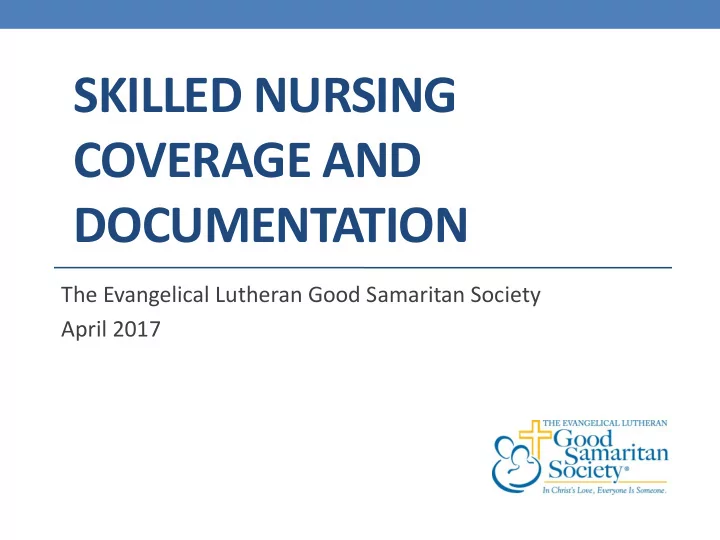

SKILLED NURSING COVERAGE AND DOCUMENTATION The Evangelical Lutheran Good Samaritan Society April 2017
Created by The Evangelical Lutheran Good Samaritan Society - April 2017 2 Skilled Nursing Documentation Needs to tell your story • What is being monitored by you as a nurse? • Why are you concerned? • What are you doing about it? • Why does care require your skills as a nurse? • Why the inpatient skilled setting? • What are the clinical goals?
Created by The Evangelical Lutheran Good Samaritan Society - April 2017 3 Admission Documentation Admit Note should include: • Conditions treated in hospital • Complications treated/at risk for • New medications • PLOF • Interventions/assessments • Discharge plans Practical Matter Statement: • The skilled services can be provided only on an inpatient basis in SNF.
Created by The Evangelical Lutheran Good Samaritan Society - April 2017 4 Daily Skilled Notes Should include: • What is being observed/monitored/assessed daily? • Nursing interventions that address unstable conditions • Complications/Risk factors and what you are doing to prevent • Teaching/Training • Medications and Treatments • Clinical response to meds/treatments and new meds/treatments • Physician contact • Documentation supporting interdisciplinary care plan approach with therapy
Created by The Evangelical Lutheran Good Samaritan Society - April 2017 5 What should Daily Skilled Note include? Each skilled note should answer 3 questions • Why Me? • What about this resident’s condition takes my skills as a nurse? Why a nurse and not my spouse or neighbor? • Why Here? • Why does the resident need care in a SNF rather than AL or home? • Why Now? • What clinical reasons are being monitored and why? What conditions, disease processes, etc. are at risk for instability and/or decline? What are the skilled interventions and the resident’s physiological response?
Created by The Evangelical Lutheran Good Samaritan Society - April 2017 6 Skilled Documentation Guidelines • Helpful tool for guiding documentation • Essential points to assess and document • Promotes critical thinking: • Complications of disease/illness and how they inter – relate • Complications or risks impacting stability and affecting health status
Created by The Evangelical Lutheran Good Samaritan Society - April 2017 7 Common Mistakes • Failure to tell the complete story makes it difficult to validate or explain care decisions • Failure to document meds / treatments • Failure to document physician and/or family notification • Failure to document change of condition or response to changes • Failure to act that may result in re-hospitalizations
Created by The Evangelical Lutheran Good Samaritan Society - April 2017 8 Rehospitalizations Avoidable Unavoidable • Condition not unstable • Condition unstable or complex with attempted • Health Care provider not management notified • Worsening medical condition • Nursing assessments despite several days of not thorough treatment • No action taken
Created by The Evangelical Lutheran Good Samaritan Society - April 2017 9 INTERACT Tools • Inter ventions to R educe A cute C are T ransfers • Stop and Watch Early Warning Tool • CICE (Change In Condition Evaluation) • Interact File Cards (S/S T,U,V) • Interact Care Path • UTI • Fever • www.interact2.net
Created by The Evangelical Lutheran Good Samaritan Society - April 2017 10 Discharge Skilled Care Discharging from SNF • Complete a skilled discharge note Discharging from skilled level of care and remains in SNF: • Complete a skilled discharge note
Created by The Evangelical Lutheran Good Samaritan Society - April 2017 11 Discharge Documentation Discharge Note: • Identify progress made toward regaining prior level of function or health status (or lack of) as a result of skilled nursing and/or therapy • Teaching and training provided • Home services (if applicable) • Discharge instructions provided • Resident’s understanding
Recommend
More recommend